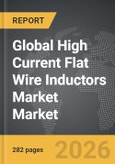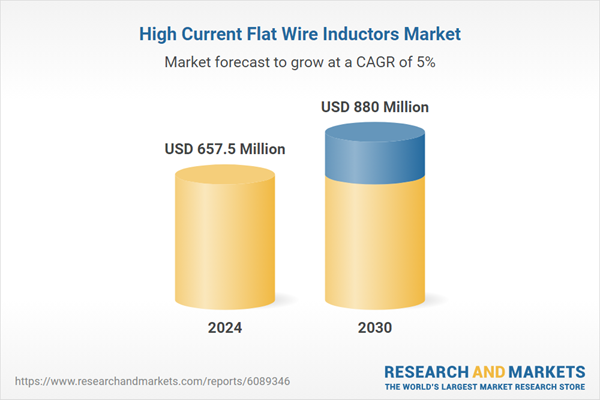Global High Current Flat Wire Inductors Market - Key Trends & Drivers Summarized
Why Are Flat Wire Inductors Gaining Popularity in High-Power Electronics?
High current flat wire inductors are emerging as essential components in modern power electronics, particularly in applications requiring compact design, high current handling, and superior thermal performance. These inductors utilize flat copper conductors instead of traditional round wires, significantly reducing AC resistance (skin effect and proximity effect losses) while allowing more turns in a limited volume. This translates into better power efficiency, lower heat generation, and improved reliability under high-frequency switching conditions.As power densities increase in sectors like electric vehicles (EVs), industrial automation, telecommunications, and renewable energy, designers are under pressure to minimize system losses while optimizing space utilization. Flat wire inductors meet these demands by enabling higher inductance in smaller footprints without compromising on thermal management or electrical stability. Their ability to operate at elevated temperatures and high switching frequencies makes them particularly valuable in advanced DC-DC converters, inverters, and onboard chargers.
How Are Design Innovations Enhancing Inductor Performance and Integration?
Technological advancements in core materials, coil winding, and thermal management are pushing the performance boundaries of flat wire inductors. Ferrite, powdered iron, and nanocrystalline cores are being optimized to handle higher flux densities while minimizing core losses across wide frequency ranges. Advanced winding techniques, including automated interleaved and multilayer windings, are improving magnetic coupling and reducing parasitic effects.Encapsulation techniques and thermally conductive potting materials are being used to enhance mechanical integrity and heat dissipation. Manufacturers are integrating flat wire inductors into modular power components and co-packaging them with power semiconductors for better system-level performance. Surface-mount and custom 3D shapes are becoming common, especially in space-constrained designs where vertical stacking and planar integration offer significant advantages.
Which Applications and Markets Are Fueling the Demand for Flat Wire Inductors?
The electric vehicle sector is the most dynamic driver of flat wire inductor adoption, with high-efficiency powertrains, battery management systems, and on-board charging units requiring compact and thermally stable inductive components. Renewable energy systems, including photovoltaic inverters and wind turbine converters, also rely on high-current inductors for grid interfacing and power smoothing. In industrial automation and robotics, compact power supplies and motor drives demand high-reliability inductors that can withstand harsh operating environments.Geographically, Asia-Pacific leads in production and consumption, driven by robust EV manufacturing in China, Japan, and South Korea, as well as strong demand from consumer electronics and data center markets. North America and Europe are expanding their adoption of flat wire inductors through increased investments in electric mobility, smart grid infrastructure, and 5G telecommunications. As high-efficiency power conversion becomes critical to virtually all high-tech applications, global demand for flat wire inductors is growing rapidly.
The Growth in the High Current Flat Wire Inductors Market Is Driven by Several Factors
The growth in the high current flat wire inductors market is driven by the rapid proliferation of high-power, high-frequency electronics in automotive, industrial, and energy applications. The push for miniaturized, efficient, and heat-resilient components is favoring flat wire designs over traditional round wire inductors. The rise of EVs, 5G infrastructure, and renewable power generation is intensifying demand for inductors that can deliver high current with low thermal and electrical losses.Innovation in magnetic core materials, winding configurations, and thermal packaging is further enabling inductors to handle greater loads in smaller volumes, improving overall power system efficiency. Additionally, regulatory focus on energy efficiency and emissions reduction is supporting the shift to high-performance power electronics, in which flat wire inductors are critical building blocks. With increasing system complexity and power density requirements, these inductors are positioned as indispensable components in next-generation electrical design architectures.
Report Scope
The report analyzes the High Current Flat Wire Inductors market, presented in terms of market value (US$). The analysis covers the key segments and geographic regions outlined below:- Segments: Type (Ferrite Core, Iron Powder Core); Application (Automotive Electronics, Consumer Electronics, Renewable Energy Systems, Medical Equipment, Aerospace & Defense).
- Geographic Regions/Countries: World; United States; Canada; Japan; China; Europe (France; Germany; Italy; United Kingdom; Spain; Russia; and Rest of Europe); Asia-Pacific (Australia; India; South Korea; and Rest of Asia-Pacific); Latin America (Argentina; Brazil; Mexico; and Rest of Latin America); Middle East (Iran; Israel; Saudi Arabia; United Arab Emirates; and Rest of Middle East); and Africa.
Key Insights:
- Market Growth: Understand the significant growth trajectory of the Ferrite Core segment, which is expected to reach US$527.6 Million by 2030 with a CAGR of a 4%. The Iron Powder Core segment is also set to grow at 6.5% CAGR over the analysis period.
- Regional Analysis: Gain insights into the U.S. market, valued at $179.1 Million in 2024, and China, forecasted to grow at an impressive 7.7% CAGR to reach $172.7 Million by 2030. Discover growth trends in other key regions, including Japan, Canada, Germany, and the Asia-Pacific.
Why You Should Buy This Report:
- Detailed Market Analysis: Access a thorough analysis of the Global High Current Flat Wire Inductors Market, covering all major geographic regions and market segments.
- Competitive Insights: Get an overview of the competitive landscape, including the market presence of major players across different geographies.
- Future Trends and Drivers: Understand the key trends and drivers shaping the future of the Global High Current Flat Wire Inductors Market.
- Actionable Insights: Benefit from actionable insights that can help you identify new revenue opportunities and make strategic business decisions.
Key Questions Answered:
- How is the Global High Current Flat Wire Inductors Market expected to evolve by 2030?
- What are the main drivers and restraints affecting the market?
- Which market segments will grow the most over the forecast period?
- How will market shares for different regions and segments change by 2030?
- Who are the leading players in the market, and what are their prospects?
Report Features:
- Comprehensive Market Data: Independent analysis of annual sales and market forecasts in US$ Million from 2024 to 2030.
- In-Depth Regional Analysis: Detailed insights into key markets, including the U.S., China, Japan, Canada, Europe, Asia-Pacific, Latin America, Middle East, and Africa.
- Company Profiles: Coverage of players such as 3Sun, Akcome Technology, Canadian Solar, EcoSolifer, Enel Green Power and more.
- Complimentary Updates: Receive free report updates for one year to keep you informed of the latest market developments.
Some of the 42 companies featured in this High Current Flat Wire Inductors market report include:
- Bourns, Inc.
- Codaca Electronic Co., Ltd.
- Coilcraft, Inc.
- Coilmaster Electronics
- Dechuang Industry Co., Ltd.
- Dongguan Xinsheng Electronic Technology Co., Ltd.
- Eaton Corporation
- EPCOS AG (TDK Group)
- Falco Electronics
- Hekeda Precision Equipment
- HFW Industries
- Liwang High-Tech Co., Ltd.
- Meritek Electronics Corp.
- MPS Industries, Inc.
- Shaanxi Shinhom Enterprise Co., Ltd.
- Shenzhen S.C New Energy Technology Corp.
- Singulus Technologies AG
- Taiyo Yuden Co., Ltd.
- Vishay Intertechnology, Inc.
- Würth Elektronik GmbH & Co. KG
This edition integrates the latest global trade and economic shifts into comprehensive market analysis. Key updates include:
- Tariff and Trade Impact: Insights into global tariff negotiations across 180+ countries, with analysis of supply chain turbulence, sourcing disruptions, and geographic realignment. Special focus on 2025 as a pivotal year for trade tensions, including updated perspectives on the Trump-era tariffs.
- Adjusted Forecasts and Analytics: Revised global and regional market forecasts through 2030, incorporating tariff effects, economic uncertainty, and structural changes in globalization. Includes historical analysis from 2015 to 2023.
- Strategic Market Dynamics: Evaluation of revised market prospects, regional outlooks, and key economic indicators such as population and urbanization trends.
- Innovation & Technology Trends: Latest developments in product and process innovation, emerging technologies, and key industry drivers shaping the competitive landscape.
- Competitive Intelligence: Updated global market share estimates for 2025, competitive positioning of major players (Strong/Active/Niche/Trivial), and refined focus on leading global brands and core players.
- Expert Insight & Commentary: Strategic analysis from economists, trade experts, and domain specialists to contextualize market shifts and identify emerging opportunities.
Table of Contents
Companies Mentioned (Partial List)
A selection of companies mentioned in this report includes, but is not limited to:
- Bourns, Inc.
- Codaca Electronic Co., Ltd.
- Coilcraft, Inc.
- Coilmaster Electronics
- Dechuang Industry Co., Ltd.
- Dongguan Xinsheng Electronic Technology Co., Ltd.
- Eaton Corporation
- EPCOS AG (TDK Group)
- Falco Electronics
- Hekeda Precision Equipment
- HFW Industries
- Liwang High-Tech Co., Ltd.
- Meritek Electronics Corp.
- MPS Industries, Inc.
- Shaanxi Shinhom Enterprise Co., Ltd.
- Shenzhen S.C New Energy Technology Corp.
- Singulus Technologies AG
- Taiyo Yuden Co., Ltd.
- Vishay Intertechnology, Inc.
- Würth Elektronik GmbH & Co. KG
Table Information
| Report Attribute | Details |
|---|---|
| No. of Pages | 282 |
| Published | January 2026 |
| Forecast Period | 2024 - 2030 |
| Estimated Market Value ( USD | $ 657.5 Million |
| Forecasted Market Value ( USD | $ 880 Million |
| Compound Annual Growth Rate | 5.0% |
| Regions Covered | Global |









